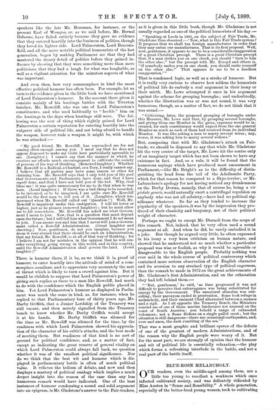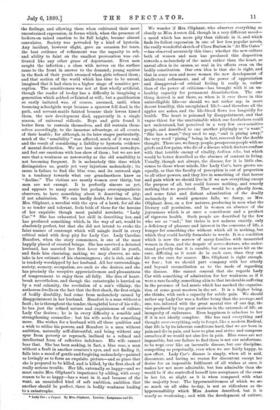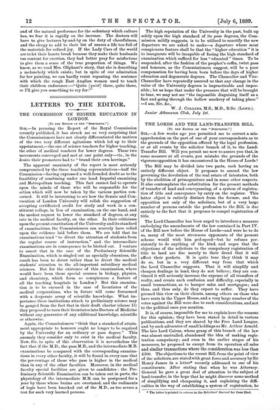BLUE-ROSE MELANCHOLY.
(117R readers, even the middle-aged among them, are a little too young to recollect a weakness which once infected cultivated society, and was delicately ridiculed by Miss Austen in "Sense and. Sensibility." A whole generation, especially of the better-bred young women, took to cultivating the feelings, and allowing them when cultivated their most unrestrained expression, in forms which, when the presence of lookers-on raised emotion to its full height, became almost convulsive. Society was pervaded by a kind of hysteria. Any incident, however slight, gave an occasion for tears, the best evidence of refinement was the capacity to sob, and ability to faint on the smallest provocation was cul- tivated like any other grace of deportment. Even men caught the infection ; a class with nerves on the surface came to the front in answer to the demand; young squires in the flush of their youth swooned when girls refused them; and that section of the world which has time to be unreal, imagined that it had risen to a higher stage of sensitive per- ception. The sensitiveness was not at first wholly artificial, though the reader of to-day has a difficulty in imagining a. generation which sobbed oifainted at will ; but a qualification so easily imitated was, of course, assumed, until, when bouncing schoolgirls wept because a sparrow fell dead in the path, and servant-maids fainted because their lovers kissed them, the new development died, apparently in a single season, of universal ridicule. Boys and girls found it better form to restrain themselves, and did restrain them- selves accordingly, to the immense advantage, at all events, of their health ; for although, in its later stages particularly, much of the " sensibility " was affected, much of it was real, and the result of considering a liability to hysteria evidence of mental distinction. We are less unrestrained nowadays, and feel our emotions with less show of them ; but we are not sure that a weakness as noteworthy as the old sensibility is not becoming frequent. It is melancholy this time which distinguishes us, gentle yet very injurious melancholy ; its cause is failure to find the blue rose, and its outward sign is a tendency towards what our grandmothers knew as "decline." The victims are mostly women over thirty, but men are not exempt. It is perfectly sincere as yet, and appears to many acute but perhaps over-sympathetic observers, to have something about it deserving of pity, if not admiration. We can hardly doubt, for instance, that Mrs. Oliphant, a novelist with the eyes of a hawk, for all she is so tender and tolerant, feels both of these for the heroine of her exquisite though most painful novelette, "Lady Car."* She has exhausted her skill in describing her, and has produced something which, in the way of art, would be absolutely perfect, but that she did not intend to evoke the faint nuance of contempt which will mingle itself in every critical mind with deep pity for Lady Car. Lady Caroline Beaufort, when the story commences, is one of the most happily placed of created beings. She has survived a detested husband, has married her first lover while still in youth, and finds him charming, making, we may observe, no mis- take in her estimate of his charmingness ; she is rich, and she is tenderly worshipped by her husband. All her surroundings, society, scenery, occupation, are such as she desires, and she has precisely the receptive appreciativeness and pleasantness of temperament to enjoy them all fully. She dies of heart- break nevertheless, and though the catastrophe is hurried on by a real calamity, the revelation of a son's villainy, the authoress dwells on the fact that the first shock, the first origin of bodily disability, had coke from melancholy caused by disappointment in her husband. Beaufort is a man without a fault ; he is throughout the tender, thoughtful lover of his wife; he has just the refined nature and exquisiteness of culture Lady Car desires ; he is in every difficulty a sensible and strengthening counsellor; but his wife seeks for something more. She wishes for a husband with all these qualities and a wish to utilise his powers, and Beaufort is a man without ambition, naturally self-distrustful, and being without any spur from poverty or reproach, inclined to a refined and intellectual form of reflective indolence. His wife cannot bear that. She has been seeking, in fact, a blue rose, a man without a fault in another creature's eyes, and not finding it, falls into a mood of gentle and forgiving melancholy—painted so lovingly as to form an exquisite picture—and so pines that she is prepared to be killed, and is killed, by the first shock of really serious trouble. Her life, externally so happy—and we must excite Mrs. Oliphant's impatience by adding, with every reason to be so happy—has a want in it, and because of the want, an unsatisfied kind of soft ambition, ambition that another should be perfect, there is bodily weakness leading to a catastrophe.
• Lady Car a Forel. By Mrs. Oliphant. London : Longmans and Co. We wonder if Mrs. Oliphant, who observes everything as closely as Miss Austen did, though in a very different mood— a mood which has more pity than ridicule in it, and which finds its fullest expression in one of her less popular novels, the really wonderful sketch of Clara Burton in "At His Gates" —has observed accurately this time ; whether the new. culture both of women and men has produced this disposition towards a melancholy of the mind rather than the heart, so unreal often in its causes, so real in its effects even on the bodily constitution. Our own idea is that she is right, and that in some men and more women the new development of intellectual refinement, and of the power of appreciation and disapproval—of critical feeling it really is, rather than of the power of criticism—has brought with it an un- healthy capacity for permanent dissatisfaction. The one thing desired is not there, as when is it ever there in this unintelligible life—or should we not rather say, in more decent humility, this unexplained life P—and therefore all the apples are ashes, and the life-blood flows too languidly for health. The heart is poisoned by disappointment, and that vague thirst for the unattainable which our forefathers could not understand, but perceived in a very few over-sensitive people, and described to one another pityingly as "a want." "She has a want," they used to say, "and is pining away," the very word " pining " being, in fact, reserved for the double thought. There are, we fancy, people, prosperous people with no griefs and few pains, who die of a disease which doctors confuse with that terrible enemy of vitality, twdium viix, but which would be better described as the absence of content in living. Usually, though not always, the disease, for it is little else, comes to those whose minds, like Lady Car's, have grown un- equally, so that the faculty of perception is out of proportion to all other powers, and they live in something of that horror and pain which we should live in if we saw everything except the purpose of all, but could foresee nothing, and remedy nothing that we perceived. That would be a ghastly doom, and some faint and distant adumbration of the deadly melancholy it would generate falls, we fancy, as Mrs. Oliphant does, on a few natures, producing in men what the literary call pessimism, and in women an absence of the joyousness which is at once a constituent and a product of vigorous health. Such people are described by the few who see as " sad ;" but theirs is not sadness exactly, only a deficiency of pleasure and interest in the concerns of life, a hunger for something else without which all is nothing, but which they could hardly formulate in words. It is a condition which is now the sorrow of many families with unmarried women in them, and the despair of nerve-doctors, who under- stand perfectly that it is curable, but can no more hit on the cure, differing as it must do in each case, than they can hit on the cure for cancer. Mrs. Oliphant is right enough, we fear ; but we should part company with her utterly and beyond reconciliation as to the mode of regarding the disease. She cannot conceal that she regards Lady Car with something of admiration for her weakness, as if it were a rare faculty, something akin to that intolerable suffering in the presence of bad music which has marked the organisa- tion of some great masters in the art. It is a higher being, she thinks, with such a capacity for subtle pain. We should rather say Lady Car was a feebler being than the average, and one, too, infected with the great mental vice of our day, the vice produced by too great easiness in the externals of life, an incapacity of endurance. Even happiness is valueless to her if it is not ideally complete. She has read everything and thought over everything, only to forget, like a modern Radical, that life is by its inherent conditions hard, that we are born in pain and die in pain, and have to plan and strive and compress ourselves if we would not also live in pain. Blue roses are not impossible, but our failure to find them is not our misfortune, to be wept over like an incurable disease, but our discipline, compelling us perpetually, even when we are fairly happy, to new effort. Lady Car's disease is simply, when all is said, discontent, and having no reason for discontent except her desire for an impossible fulfilment of all wishes at once, it makes her not more admirable, but leis admirable than she would be if she controlled herself into acceptance of the cross in her lot, so slight as it is when compared with what the majority bear. The hypersensitiveness of which we see so much on all sides to-day, is not so ridiculous as the hyperseneibility which Miss Austen described, but it is nearly as weakening ; and with the development of culture, and of the natural preference for the sedentary which culture has, we fear it is rapidly on the increase. The doctors will have to give lectures by-and-by on the duty of cheerfulness, and the clergy to add to their list of snares a life too full of the materials for refined joy. If the Lady Cars of the world are to let their hearts break because they make their husbands too content for exertion, they had better pray for misfortune to give them a sense of the true proportion of things. We know, as we read Mrs. Oliphant's story, that she is describing a melancholy which exists ; but in spite of our admiration for her painting, we can hardly resist repeating the sentence with which the rough East Anglian women used to teach their children endurance :—" Quite [quiet] there, quite there, or I'll give you something to cry for !"












































 Previous page
Previous page